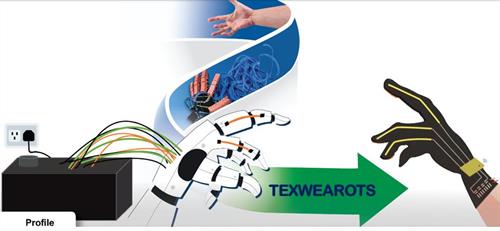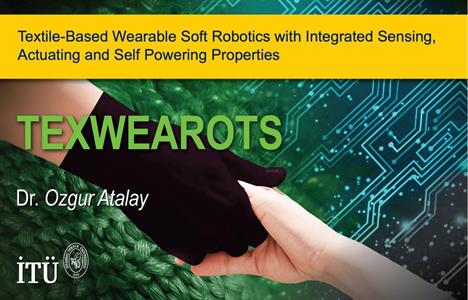Assoc. Prof. Özgür Atalay's project named "TEXWEAROTS" was granted support by the EU's Horizon Europe Program, European Research Council (ERC) Initial Level.
Textile-Based Wearable Soft Robotics with Integrated Sensing, Actuating and Self Powering Properties – TEXWEAROTS, which has been awarded with 1.5 million Euros by the European Union Horizon European Program European Research Council (ERC), aims produce textile-based robotic structures that will have the ability to sense, move and produce energy, and truly wearable soft robotic structures. It is aimed to use the robotic structures to be produced in this project, which is the second ERC project undertaken by our university, in the treatment of individuals with muscle weakness.
Although textile-based and silicone-based wearable soft robotic structures produced today are called soft systems, they contain a lot of rigid and heavy parts, and the energy requirement for these systems is another problem. The systems to be produced within the scope of the TeXWEAROTS project aim to find solutions to the problems faced by wearable robotic structures today. The knowledge that will emerge within the scope of this project will contribute not only to soft robotic systems, but also to studies in electronic textiles and flexible and wearable energy systems.
We congratulate our faculty member and wish him continued success.
About Assoc. Prof. Dr. Özgür Atalay
Assoc. Prof. Dr. Atalay completed his master's and doctorate studies in the field of smart textiles at the University of Manchester in England. Doing post-doctoral research in soft robotic systems at Harvard University in the USA, Dr. Atalay received a Marie Curie Individual Research Fellowship (IF) within the scope of the EU Horizon 2020 program in 2019. He continued to work in the field of smart textiles and soft robotics with various international and national projects he took in the following periods. Currently, he continues his work under the softsensorslab working group, which he manages together with Assoc. Prof. Dr. Gökhan İnce.
News: ITU Media and Communication Office

